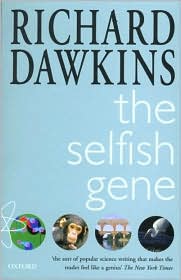
The Selfish Gene
Richard Dawkins
(Oxford University Press, Oxford, New York: 1989)
First published by Oxford University Press in 1976. This edition, 1989, with extensive endnotes updating the original material, as well as two new chapters.
READ: March-April 2008
Why does Richard Dawkins get such a bad name? His name is constantly being bandied about, and now that I've finally read something of his, it's a bit unfair, I think. This is an exceptional book, and really cleared up a lot for me regarding genetic theories and evolution.
I think the thrust of the misunderstanding of Dawkins, at least in regard to this book, is that people misinterpret (whether purposely or not) what he means by a "selfish gene". He doesn't believe that any one particular gene, sitting inside my body right now, is so selfish that it will do whatever it can to perpetuate itself. We would have gone extinct long ago were that the case. Obviously there is a reason that life on earth is so varied. Rather, and I am sure I am oversimplifying it here to such a degree that Dawkins would probably no longer agree with me, genes act selfish on the class level. It is classes or groups of genes that are selfish, not individual ones. And because they are selfish, they try to find the best ways to perpetuate themselves, but at the macro- not micro-level, if that makes any sense.
It's a bit daunting at first, but once you get going, his style is clear, simple, and immensely readable. It's a complex subject, but he's not afraid to take time with it and give good, concrete examples of each point. Somewhat amusingly, since this particular edition is a 1989 update of the 1976 original, he has added extensive footnotes that counterpoint arguments that have been made against his theories. He also - and this is one of the marks of a good scholar - is quick to note where his theories have since been proven incorrect, and often takes a page or two or more to elaborate a different or a concurrent theory to replace the old, incorrect one. This is probably one of the more enjoyable books that I've read so far this year.
No comments:
Post a Comment